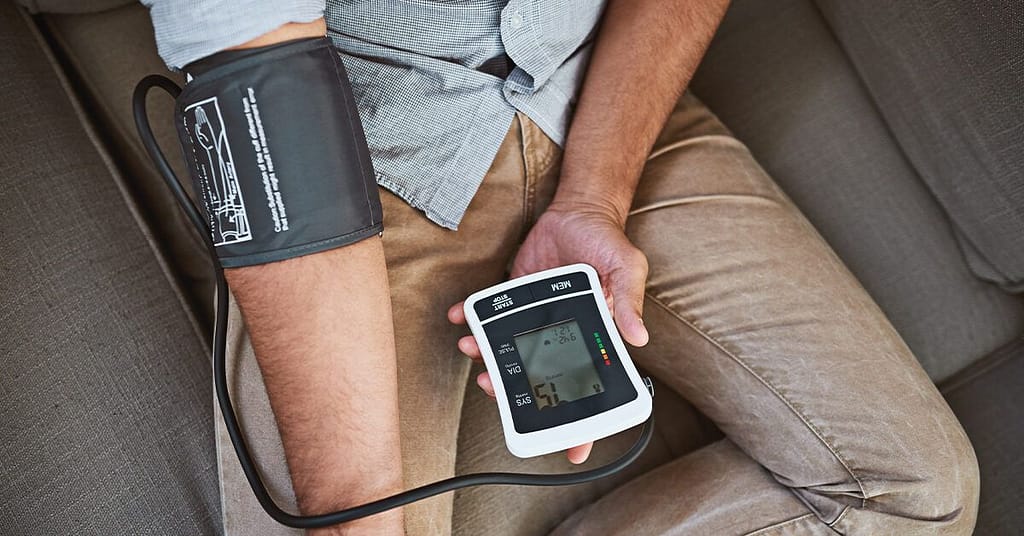Blood pressure refers to how hard your blood pushes against the walls of your arteries. It’s normal for blood pressure to rise and fall a bit during the day. However, when blood pressure remains high over a sustained period of time, you likely have high blood pressure, also known as hypertension.
High blood pressure is fairly common. In the United States, nearly half of adults have high blood pressure or take medication to treat it.
High blood pressure has a well-deserved reputation as the “silent killer.” That’s because there are often no symptoms until there’s a life threatening complication, like a heart attack or stroke.
Some people with high blood pressure do experience fatigue, but what’s the connection between them? This article will help provide answers to that question.
A blood pressure reading consists of two numbers:
According to the American Heart Association, a normal or healthy blood pressure reading is less than 120/80 millimeters of mercury (mm Hg). The following categories define blood pressure readings that are above this level.
Feeling tired may be connected to high blood pressure itself. It may also be a symptom of a coexisting condition. Left untreated, high blood pressure can lead to several serious complications that can cause fatigue.
Let’s take a closer look at some of the ways that high blood pressure may result in feelings of fatigue or tiredness.
High blood pressure can damage your arteries or cause them to narrow, which can impair blood flow.
In addition to fatigue, other symptoms of coronary artery disease can include:
High blood pressure can lead to narrowed arteries in your limbs, stomach, and head. In addition to fatigue, symptoms of peripheral arterial disease can include:
High blood pressure means your heart has to work that much harder. It’s a muscle, so that extra work results in an enlarged heart.
A bigger heart requires more oxygen, but it’s hard to maintain a good blood flow to get oxygen to the heart. Without treatment, the strain can lead to heart failure.
High blood pressure can limit blood flow to your kidneys. It can also damage tiny blood vessels within your kidneys, making it difficult for them to do their job of filtering blood. Eventually, it can lead to kidney failure.
Although fatigue can be a symptom of high blood pressure, a lack of sleep may actually be a contributing factor, too.
Sleeping 5 hours or less per night may raise your risk for developing high blood pressure. And if you already have high blood pressure, lack of sleep could be making it worse.
In addition, obstructive sleep apnea is a known risk factor for hypertension, especially in older age groups.
Some prescription medications used to treat high blood pressure can also cause fatigue.
Another cause of fatigue could be due to pulmonary artery hypertension. This is when you have high blood pressure in the vessels that carry blood between your heart and lungs. Along with fatigue, it can cause chest pain, shortness of breath, and lightheadedness.
There are usually no symptoms or warning signs that you have hypertension. That’s why it’s so important to monitor your blood pressure.
It’s especially important to see your doctor if you’re experiencing:
Regular blood pressure checks are the best way to diagnose hypertension early. As mentioned above, a reading of 120/80 mm Hg or less is considered healthy for adults.
Anyone can have a single high reading. Your doctor probably won’t make a diagnosis of hypertension until you’ve had multiple high blood pressure readings.
Your doctor will likely suggest some lifestyle recommendations to lower your blood pressure, such as:
Your doctor will also consider your age, coexisting conditions, and any other medications you take when treating your blood pressure. If necessary, your doctor may prescribe hypertension medications. These include:
Some of these medications can cause you to feel tired.
Other treatments depend on the extent of damage to your heart, kidneys, and overall health.
There are many risk factors for hypertension, some of which are within your control. You may be able to lower your risk for developing high blood pressure by:
Ask your doctor if any of your medications could potentially contribute to high blood pressure and how that can be managed. Also, be sure to have your blood pressure checked regularly.
There are several ways that feeling tired may be connected to hypertension. Fatigue can be a symptom of heart or kidney damage as a result of high blood pressure. Feelings of tiredness may also be linked to hypertension medications, lifestyle, or coexisting conditions.
Certain lifestyle changes may help lower your blood pressure or reduce your risk for developing hypertension in the first place. If needed, there are also different types of medications that can help.
The best way to get a handle on your blood pressure is to have it checked regularly. Fatigue is a quality of life issue, but there’s help. Report this and other new or worsening symptoms to your doctor.
Last medically reviewed on October 23, 2020
Our experts continually monitor the health and wellness space, and we update our articles when new information becomes available.
Current Version
Oct 23, 2020
Written By
Ann Pietrangelo
Edited By
Claire Brocato
Medically Reviewed By
Angela M. Bell, MD, FACP
Copy Edited By
Nastassja Myer
Share this article
OUR BRANDS
Does High Blood Pressure Make you Tired, Sleepy? – Healthline
